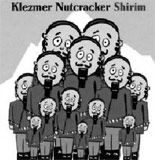You never knew you loved... Klezmer carols a little different for the season
Christmas music has gone through many iterations, from orchestral arrangements to classic crooners to the R&B and pop albums most malls start playing the second Halloween is officially over. Every so often there's the unexpected and refreshing punk or metal album, and even Christmasthemed parodies (including multiple contributions by musical satirist Weird Al Yankovic).
With Christmas becoming increasingly secular, and the rising frequency of interfaith families celebrating multicultural holidays, Klezmer carols were, in a way, inevitable.
Up until the twentieth century, the term “Klezmer” was a term for musical instruments, and has only recently been extended to the musicians who play them and the genre being played. The style has come down through Jewish musical traditions that draw on devotional roots dating back to Biblical times.
One of the unique characteristics of Klezmer is that it is not as structured as Western instrumental or classical music. In fact, its performance bears more similarities to jazz, with flexible counting and variable keys meant to emulate and express moods, as well as get audience members dancing.
For anyone who is a fan of cross-cultural covers, Klezmer carols offer a breath of fresh air across an increasingly tired musical landscape. Personally, I'm still waiting for White Christmas, the film based around and named after Jewish composer Irving Berlin's now classic carol, to go Bollywood. But, pending that, there's still plenty of Klezmer to choose from:
 Shirim Klezmer Orchestra:
Shirim Klezmer Orchestra:
Reinterpreting one of the most celebrated
Western orchestral pieces,
Tchaikovsky's Nutcracker Suite,
the Klezmer Nutcracker album
released in 1998 is a somewhat
satirical play on the original piece.
The Waltz of the Snowflakes is
reinterpreted as the Waltz of the
Ruggelah, and the opening scene
of tree decorating is paralleled in
the opening track, Kazatsky ‘til
you Dropsky.
The Kletzmonauts:
Perhaps the
most well-known album in the
genre is Oy to the World: A
Klezmer Christmas, released in
1999. Such classics as Deck the
Halls and Jingle Bells are played
in true Klezmer fashion, with
unexpected keys and scales, providing
new and invigorating texture
to Christmas staples.
For anyone who has ever wondered what Rudolph the Red-Nosed Reindeer would sound like in Yiddish, there is a 2007 reinterpretation by San Francisco ensemble Kugelplex available to provide the answer. The single was never released on an album, but is available for download on the band's website, or for casual enjoyment on YouTube.













